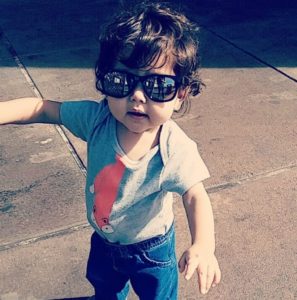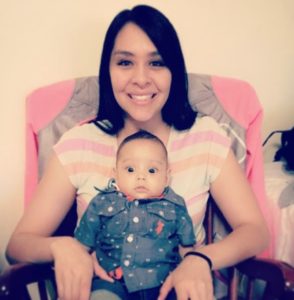A Kitchen That Serves Hope
Growing up, whenever Kylie needed to talk to her parents, there was one room in which they would always congregate: the kitchen. If she needed to chat about something that happened at school, or just wanted to vent, Kylie and her family would go to the kitchen and enjoy a meal together.
“That’s what makes a home for me – the kitchen.”
It’s no surprise, then, that Kylie’s favorite room in our House was the kitchen. The kitchen provided her comfort, which was desperately needed while her infant son endured months in the NICU, and while she spent nearly six months away from her family, including her older son. This is where she learned how to cope, where she discovered that she wasn’t alone. Where she found hope.
When Kylie was 14 weeks pregnant, her doctor presented her with an optional test, one that would check for a variety of genetic disorders. She was leaning toward refusing it, but she had gotten it when she was pregnant with her first son, Tachen, so ultimately decided it wouldn’t hurt to have it done this time, too. The test came back positive for a marker often associated with spina bifida. The result was unnerving for Kylie, but the doctor wanted to confirm the diagnosis with an ultrasound, which led to some mixed news.
The ultrasound did not reveal spina bifida, but it did show another problem. The baby’s intestines were forming outside of its body, a condition known as gastroschisis. Kylie recalls hearing that word for the first time, and asking the doctor for more information. She received some pamphlets and started to research. The more she learned, the more she panicked about the reality she faced.
“Ok, this is real. This is not a dream. I lost it.”
Despite the panic, she traveled nearly four hours from her home in Northwest New Mexico to Albuquerque, to have another ultrasound done, and a doctor there walked her through the different scenarios she could be looking at after her child’s birth. He had a plan for each scenario, and the folks in the NICU were confident in their abilities to handle a case like this. Kylie’s worry eased a little, as she prepared for the unknown. 
In November of 2016, at 34 weeks, Kylie gave birth to a beautiful baby boy – Oliver. To her and the doctors’ surprise, Oliver’s intestines were no longer on the outside of his body. He looked like a normal newborn who was born a few weeks early. However, tests revealed there could still be a problem. Oliver was taken to surgery, where they discovered he had just 12 centimeters of viable bowel.
With his compromised digestive system, Oliver had to receive nutrition from total parenteral nutrition (TPN) through a PICC line. He needed to be closely monitored, so he stayed in the NICU for the next month. He wasn’t growing very quickly, and with all of the lines and ports hooked up to his tiny body, Kylie found it difficult to bond. For the first three weeks of Oliver’s life, she couldn’t even hold him. “He was so little and I was afraid I was gonna break him,” Kylie says. It was quite a bit different than the experience with her first child, who she could hold immediately and take back home. She needed to find a way to connect with Oliver, so she would often sit next to him and just touch him. She had to make some contact “so he knew that I was there,” she says.
While the TPN was helping Oliver to grow, it was also doing a number on his vital organs. His liver count was down, and he became terribly jaundiced. It became clear Kylie would need to take her son elsewhere so he could receive more specialized care. After doing some research on her own, she learned about a couple of options. One of those options was recommended by some specialists in Albuquerque as having an excellent program for newborns with Oliver’s diagnosis. Kylie knew her answer.
He needs the best, so let’s go to Omaha.
Kylie had never left the four-states area (New Mexico, Colorado, Utah, and Arizona) so getting on that Medivac plane was frightening. She remembers being in the air and thinking ‘how is this gonna work? Is he gonna be in the NICU for a long time? Am I gonna stay in the hospital?’
Terrified mother and newborn son arrived in Omaha, where Oliver was given a room in the NICU at Nebraska Medicine. A social worker told Kylie that the Ronald McDonald House was an option for her, but at that moment, there were no rooms available (a problem that will no longer be a problem, thanks to our Hope and Healing Expansion). She’d be placed on the wait list, and until a room opened up, she would stay in lodging provided at the hospital. Kylie had stayed in a Ronald McDonald House in Albuquerque, and had also worked at McDonald’s for a few years earlier in her life, so she had an idea of what to expect.
After a few days, a room became available. Upon walking through the doors, Kylie remembers being greeted with the smiling face of our Program Coordinator, Vicky Coleman. “She was just the sweetest ever,” Kylie says. She was immediately put at ease by Vicky’s compassion and genuine level of care. She received a tour, during which she saw families interacting, and kids playing, and felt comfortable for the first time in a long time. And of course, she felt right at home once she found the kitchen, where she was able to grab a cup of coffee and relax. “I felt like I could just breathe. It was a really good feeling.”
 Meanwhile, Oliver was going through treatment in the NICU, where Kylie was learning more about medical terminologies and procedures than she ever expected to. To say it was confusing would be an understatement. “My brain was on overload,” she says. While she had a background working in some medical offices, Oliver’s case was well beyond anything she had ever encountered before. Kylie took the challenge head on, though. She had always considered a career in nursing, so now she could learn what that might be like.
Meanwhile, Oliver was going through treatment in the NICU, where Kylie was learning more about medical terminologies and procedures than she ever expected to. To say it was confusing would be an understatement. “My brain was on overload,” she says. While she had a background working in some medical offices, Oliver’s case was well beyond anything she had ever encountered before. Kylie took the challenge head on, though. She had always considered a career in nursing, so now she could learn what that might be like.
“I kind of enjoyed it because I was expanding my knowledge on some things. I never knew I was capable of dealing with something like this. It was a struggle for me, but I think I did pretty well, all things considered.” According to Kylie, something else that helped her navigate this struggle was the support she received from other families staying at the House.
On a seemingly nightly basis, Kylie would join other parents in the kitchen, where they would simply sit and chat about things that only they could comprehend. “I didn’t feel so alone. My family tried to follow along, but they weren’t in it. They tried to understand, but they just couldn’t. When I came to the House and visited with other families, they got it. They understood. I could speak ‘doctor lingo’ with them, and they would know what I was saying.” Moreover, the other parents could provide advice or techniques on things Kylie could try that had worked for them.
After two months, Oliver was able to join Kylie at the House, where Kylie was making friendships with others as she empathized with and learned from them. She grew especially close to a pair of single moms, Maria and Victoria. “We supported each other, distracted each other, and had some really good times,” Kylie says, “It was nice to have. From being secluded and alone for so long to meeting somebody who had things in common with you. Somebody who would say ‘it’s okay to cry, and it’s okay to feel angry and upset.’”
That support system certainly was not a one-way street, either. When asked what her favorite day at the House was, Kylie immediately answers: “the baby shower we threw for Maria. That lady was such a trooper. She deserved to have something good.”
Here was Kylie, a woman who had an infant facing a life-threatening illness, who was nearly a thousand miles from home, a thousand miles from her other son, and all she wanted to do was make another parent feel loved. So she and a few other moms got together and threw a baby shower – in the kitchen, of course. “I got to make somebody else feel the way that they made me feel.”
Being surrounded by so many parents who understood what she was going through provided hope and strength to Kylie, right when she needed it most. She says hearing other stories, and seeing their perseverance, encouraged her to stay positive and simply do the best she could. “We were gonna help each other out.” When considering how differently things could have gone without that support system, Kylie’s voice trails off, “I…I just, I don’t know what I would’ve done.”
And it wasn’t just the other parents that helped, but also the staff. She says, “I love the people that work here. I think you guys are amazing.” She adds with a smile, “You guys are my favorite people ever. You’re genuine people. There’s no front, you really do care about the families and the kiddos that are going through what they’re going through.”
You guys are my favorite people ever. You’re genuine people.
That initial stay in Omaha lasted for more than four months, at which point Oliver was healthy enough to go home. As happy as Kylie was about that, there was also a bittersweet feeling. She had grown close with many people in our House. People who made her feel like family, not someone to pity. People who were always willing to sit with her in the kitchen, and just talk. Ultimately, the kitchen may have been Kylie’s favorite room in the House, but it was the people who joined her there that made it so.
Our kitchen is very much the heart of our House, where families truly come together to support each other. To see this happen in-person, sign up to join our Meals That Heal program by contacting Alexandra Benson at abenson@rmhcomaha.org or 402-346-9377.

